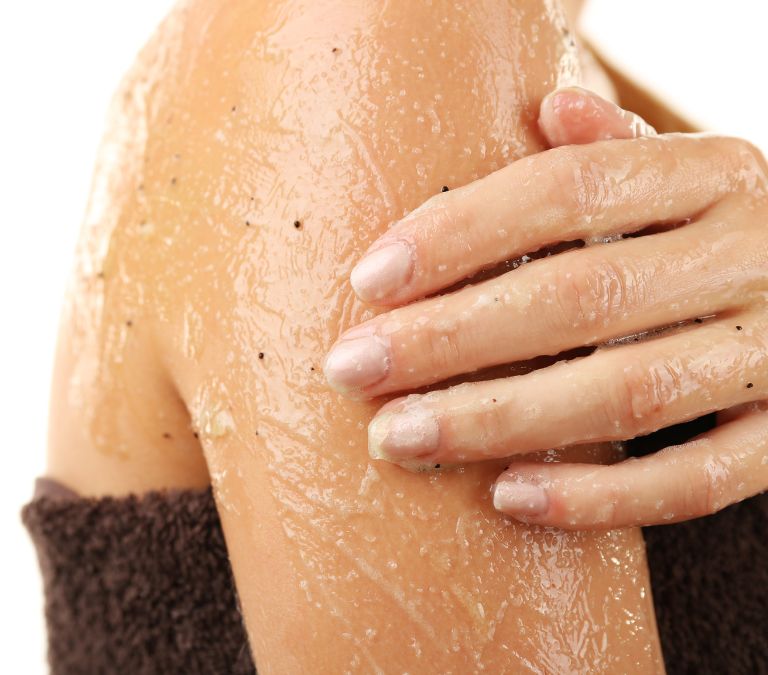Have you dealt with body odor in the past? Or maybe you had someone in your life who made you wonder whether the store ran out of deodorant each time they were close enough for you to catch a whiff. Body odor can be annoying for the person who has it (if they are conscious enough) and the people around them. We do not want to deal with body odor, so it is annoying when you find out that menopause might make you face that challenge.
There is already a lot you have to deal with, thanks to the many annoying symptoms of menopause. So, realizing that we might be stinking the place up due to menopause could be stressful. We all know that menopause on its own is stressful enough without any burden from somewhere else.
Anyway, not to worry, I am here to give you a bit of help. I will take you on a bit of a journey, and at the end of this journey, you will understand why we have to face this problem and the different ways you can handle it, but let us start by finding out why this happens to us.
Why You May Have Menopausal Body Odor

I am sure that when you hear body menopausal body odor, the first thought that comes to mind is “Sweat.” However, this is not entirely the case. Sweat on its own does not smell. So you could be sweating buckets and not have a whiff of menopausal body odor. However, sweat can get very smelly.
Let’s try and understand the physiology behind this a bit. Your apocrine glands produce sweat. These glands are found in the armpits, breasts, and genital-anal areas. As we mentioned before, this sweat does not smell in isolation, but they contain acids. And the bacteria present on your skin break these acids down, producing waste products that give off this odor.
Body odor appears as a person enters puberty when the apocrine glands are fully established. Men, on average, have more problems with body odor than women since they sweat more. However, it seems that women undergoing menopause see an increase in this phenomenon. I had a friend who could swear that she smelled like garlic a couple of hours after a fresh shower.
And this got me thinking, could there be a reason why menopausal women seem to be more likely to smell? Could there be reasons relating to menopause that make our sweat smell more? So I decided to do some research and came up with why this is so.
- Hormonal Imbalance
If there is one thing we are sure of happening during menopause, it is that our hormonal balance tilt. The primary change is the fall we notice in our body’s estrogen level. With this change in estrogen, your body’s temperature will also start seeing differences. Estrogen aids in temperature regulation in the brain.
During menopause, however, the brain interprets the hormonal shift as a rise in body temperature. The brain then uses sweating to try to lower body temperature. Like I have said before, sweat has no odor of its own. On the other hand, sweat generates body odor by dissolving germs or debris in your pores and skin.
These drops in estrogen can also cause hot flashes and nocturnal sweats, which means you’ll sweat more and produce more stink.
- Digestion of Food
Something else that changes when we hit menopause is how we digest food. In the majority of cases, our metabolism becomes slower. So if you eat, your body will find it difficult to pass it out. And this change is also due to the decrease in estrogen we deal with during menopause. When estrogen levels drop, everything slows down, and our elimination becomes less efficient.
What happens is that the body will frequently use sweat as a technique to clear itself of excess wastes. These wastes are then used as food by bacteria on our skin. These microorganisms can also cause changes in body odor. Because when they break down the waste in our sweat that is a result of what we ate, we tend to smell like what we ate.
So let’s say you are like the friend I mentioned earlier who smells a lot like garlic even when it has not been so long since she took her bath. The likelihood could be that you are smelling the way you do because of something you ate.
- Dehydration
Do you know that the changes in your hormone level could also affect your hydration? Your body is, majorly, water. To ensure the precise management of body fluids volume and concentration, integrated neuronal and hormonal mechanisms have evolved to govern thirst and sodium appetite. These mechanisms are managed by estrogen and progesterone. These are both hormones that decrease during menopause. As you age, you might need more water, or you could get dehydrated.
If you’re very dehydrated, your sweat will become much more concentrated, and the odor will be noticeably greater. So, if you see any changes in your body odor, the first rule is to drink water. Remember to drink enough water every day; it may be enough to solve all of your problems.
- Stress
We all know that menopause is not an easy period to deal with. We have all the problematic symptoms that keep us on edge. It is also a period of life when you may experience significant amounts of anxiety and stress, which can cause you to sweat. When we are agitated, apprehensive, afraid, or in pain, we sweat more, so many women sweat more throughout menopause.
Some folks also perspire after they eat. Anxiety sweat is distinct from sweat caused by hot weather or activity and is frequently more odorous. The apocrine glands in your armpits and groins create anxiety sweat, a fatty sweat bacteria enjoy.
- Heightened Sense Of Smell
There is also the possibility that you do not smell as much as you think. It’s important to remember that your perception of smell changes throughout menopause, and you may think you smell bad even if you don’t. It includes not just bodily odor but also other odors. You may notice that your sensitivity to the smells of paint, perfume, and pollution has increased significantly. So, if you’re experiencing a constant change in your sense of smell, it’s more than probable that your sense of smell has just become more acute.
- Consumption Of Sugar
When sugar from refined foods is found in the blood after eating, it has been discovered that it alters the biochemistry of our sweating (in some people) when it interacts with germs on the skin. Sugar is consumed by bacteria and fungi that generate odor. You are more likely to have that foul odor if your blood sugar levels are pretty high. Furthermore, junk foods are deficient in several nutrients, including chlorophyll, which aids in neutralizing bacteria that cause body odor.
- Magnesium And Zinc
Your body odor could also result from a deficiency in what you are eating. A magnesium or zinc deficiency in the diet can also cause foul body odor. One of the critical functions of zinc is to convert carbs to waste, but if you don’t get enough of it, this process is slowed, and smells might develop. Furthermore, insufficient magnesium promotes slower stool emptying, affecting your body odor.
How Do You Prevent Menopausal body odor

Body odor can have very negative implications in our lives. Constant worry by someone who smells due to menopause will affect the person’s confidence level. I don’t imagine how it would feel stepping outside and wondering if everyone is turning up their nose as you work by.
Your mental health is most likely to take a nosedive. You’d probably end up more stressed than you should be, which would lead to even more smelly sweat. You are here because you are tired of feeling this way and want to change it. You are here because you need help combating odor, and I am here to provide you with that much-needed help.
Preventing or removing body odor is possible; you do not need to break a vault to achieve them. Let us look at some things you can do to prevent body odor.
- Your Diet
Much of what we put in our mouth contributes to most bodily functions. Your body will smell so much better and feel so much better, too, if you were to increase the consumption of some food items while reducing the consumption of others. I have compiled a list of what you should eat and avoid to prevent the stink of body odor.
- Try Alternative Protein Sources
Because certain foods might exacerbate body odor, protein sources should be considered while attempting to reduce body odor through diet. Carnitine, an amino acid found predominantly in beef and pig, demands your intestines exert extra work to break it down.
Flavin monooxygenases are enzymes in your gut that break down the amino acid so you can remove it from your body, but if there are not enough of these catalysts, you could smell “fishy.” Overeating red meat might lead to an increase in body odor.
Poultry, soy, and beans are suitable protein substitutes for beef and pork. Fish is another option, but overeating might make some people smell fishy. Oysters, crab, and shrimp are great additions to any dish. If you must eat meat, white meat may be preferable to red meat.
- Consider A High Fiber Diet
Body odor can be caused by a diet high in processed foods and a lack of plant-based meals like fresh vegetables, beans, and fruit because you’re losing out on the natural cleansing properties of these foods.
Plant meals contain fiber, which aids in cleansing the body by promoting healthy digestion. At most meals, a salad with baby spinach and kale and a variety of other fresh vegetables, such as carrots, peppers, and cucumbers, will help you enhance your plant-based intake. Wheatgrass is also an excellent choice for preventing body odor. Because of its high chlorophyll content, it is used as a natural deodorant.
However, not every vegetable helps in fighting body odor. Too much broccoli, cauliflower, or cabbage can produce a body odor due to the sulfur in this brassica group. So it would help if you reduced consumption of these to the minimum.
- Eat Foods That Are Rich In Magnesium And Zinc
I like to call these minerals the smell of good minerals because that is what they do. Apart from being essential for bone health, these minerals leave you smelling lovely. So if you are looking for what to eat to reduce body odor, then look for foods rich in this nutrient. So many options are open to you, but ensure you are not picking foods that would also add to your problem. My favorites include broccoli, pecans, tofu, oysters, shellfish, yogurt, and shitake mushrooms.
- Consume Sweet Smelling Fruits And Vegetables
I mentioned how our body starts giving off what we eat as smells, especially as we grow older. If you cook with garlic and onions, you might want to start avoiding them or at least reduce them to the smallest possible amount. While you are at it, you should also try foods that give off a naturally sweet smell.
Imagine how a good many fresh green vegetables can make your insides smell. If you season your food with garlic and onion, your body may begin to smell like these ingredients.
Herbs high in chlorophyll, the component that gives plants their green color, can help with body odor. These foods include wheatgrass juice and herbs like parsley, cilantro, and mint.
Citrus fruits are delicious, but they’re also a fantastic source of fiber, and the acid in them easily flushes through your system, removing substances that could produce odor. When dieting to lose weight, have a grapefruit in the morning or an orange as a snack.
- Reduce Your Consumption Of Odor Causing Foods
As much as I am big on talking about the foods we should eat to prevent body odor, there are other foods we should avoid. These foods exacerbate the entire problem and increase the chances of smelly sweat. Body odor can be caused by foods that make you sweat more, such as jalapenos or other spicy foods.
Processed foods, a lot of red meat, alcohol or caffeine, and dishes prepared with garlic and onion can make your body stink. Spicy foods can sometimes cause your sweat glands to overwork. It can lead to an increase in body odor. Garlic or onion odors can flow through your sweat, leaving you smelling like a garlicky, oniony cloud. Caffeine and alcohol can also increase sweating.
- Drink Lots Of Fluid
That much should be clear by now. You already read where I mentioned the impact of dehydration on your sweat and how it can induce body odor. Make sure you get plenty of water. Water aids in the removal of pollutants and cleanses the body. It also aids in cooling you down and preventing excessive sweating. And even when you sweat, it is cleaner and more diluted and would not smell as bad as it would if you were starving yourself of the life fluid.
When you drink water, you feel a lot better. Drinking water minimizes hot flashes and nocturnal sweats and keeps you hydrated. These symptoms frequently appear in conjunction with other changes that occur with menopause. Professionals recommend that you consume at least eight glasses of water per day.
- Keep As Clean As Possible
Not to run the risk of sounding cliche, but you should stay clean if you want to prevent body odor. Showering at least once a day is recommended to remove some germs that have settled on your skin. Sweat has a virtually slight odor. When germs on the skin interact with sweat, they proliferate quickly and produce a pungent stench.
Body odor is improved by scrubbing vigorously, especially where you appear to sweat. Showering at least twice a day may become necessary for menopausal women. It is recommended that you shower before going to bed to avoid night sweats. If night sweats are a problem, it’s also a good idea to bathe in the morning. It will ensure you eliminate the mixed bacteria with your sweat the night before.
- Dress For The Occasion
Forgive the corny heading, but you really should start dressing more appropriately. How you dress could cause you to sweat a lot, which would increase the probability of getting body odor. Not only will wearing the appropriate clothes help you look good, but it will also make you smell nice!
Always put on loose and clean clothes. They might not be entirely baggy. Wear clothes that are not overly tight to avoid body odor. You and your skin should be able to breathe through your clothing. Cotton clothing is a fantastic choice during menopause. If you notice that you’re sweating a lot, change your clothes.
Clean clothing aids in the control of body odor. Make sure to replace your socks regularly, especially if you have a nasty foot. Wear antiperspirant powders inside your footwear, replace your insoles regularly, and go barefoot.
- Reduce Stress As Much As Possible
Stress sweat is smelly sweat. We already said that, so if you are trying to combat the onset of body odor, you should also be trying to banish stress from your life as much as possible. Make sure you’re comfortable the majority of the time. Make an effort to be stress-free!
It will keep you from sweating excessively. Sweat can lead to the formation of bacteria. It makes one’s smell terrible. So, keep your cool and smell wonderful! You must find techniques to relax to avoid the foul type of sweat. Practicing yoga and mindful meditation are excellent methods to calm your thoughts, and a pleasant walk in the fresh air can help you relax.
- Stay As Cool As Possible
Even after taking all possible safety measures, there is still a very high chance that you might sweat or find yourself in a situation where the cases of sweating are very high. For this reason, you should stay as cool as possible. You can always carry cleansing wipes with you for a quick refresh.
Make sure the product you’re using is mild enough to utilize regularly. Various items also keep you excellent at home and on the go. It would be best if you also made conscious choices about keeping cool. Make clothes in materials that will not cause you to heat up. Your beddings should keep you as cool as possible. Blast the air conditioner at a level that will keep you cool enough. The bottom line is to stay as cool as possible.
There you have it. Body odor is very much possible during menopause, and we realize it is very frustrating, so we brought this guide to help you. However, you must understand that you must cover all the grounds and try everything possible to prevent menopausal body odor. We have enough to deal with already.







